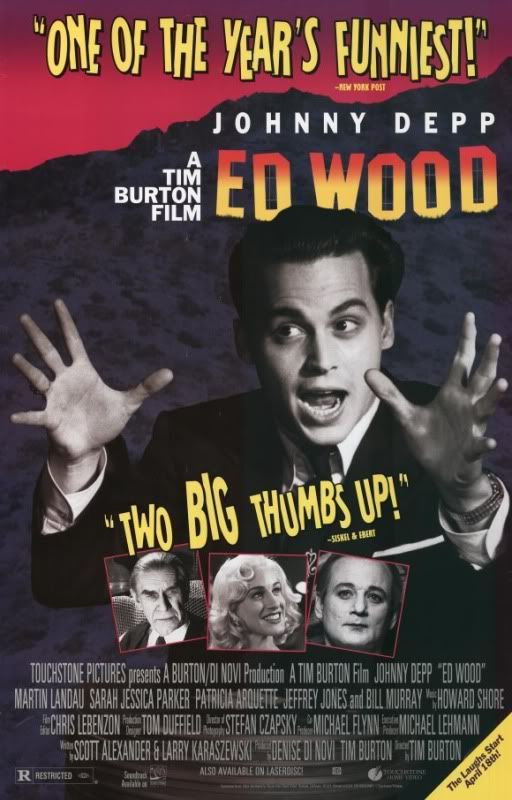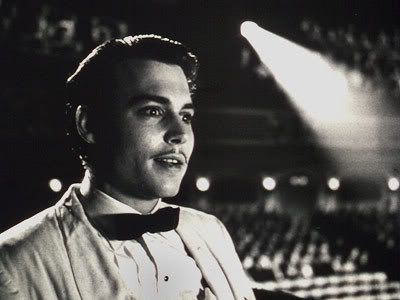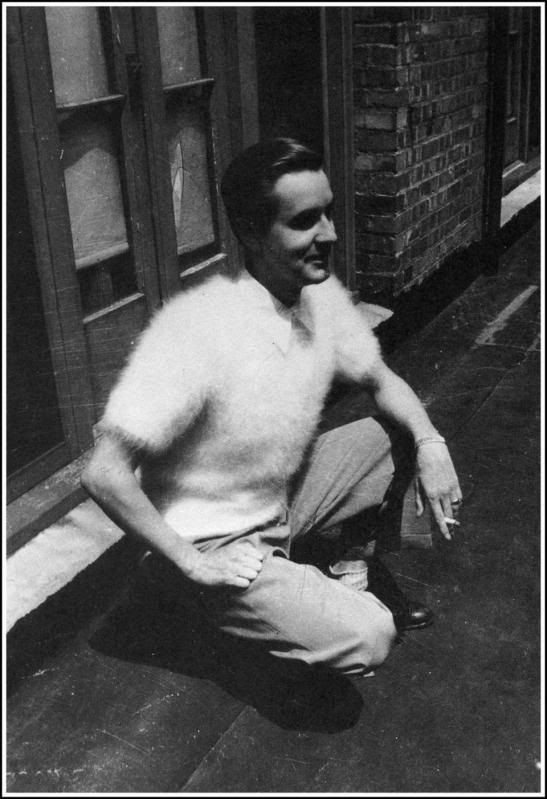 |
| Fig. 1 Ed Wood Film poster |
Ed Wood is a charming film that is as authentic as it is enjoyable. The film itself is a biopic about a film director of the same name, who's most famous for being voted the 'Worst Director of All Time'. His films have received cult status due to their unconventional narratives, poor special effects and scripting, leading them to be scathed by critics but enjoyed by fans of Edward D. Wood's passion to make what he loves.
 |
| Fig. 2 Edward D. Wood Jr. |
The director, Tim Burton, is well known for his love of 1950's B-Movies. They are films with so little budget that the director can only hold them together with his passion for them and it is this passion that the director portrayed so strongly in his depiction of Ed Wood. As Steve Erickson describes "Wood's passion for movies isn't a frame less ferocious than Orson Welles's" (Erickson, 2005:84) and this is no more clear than in a sequence where Ed Wood meets Orson Welles himself. They both have the same passion, the same problems with their studios, it's just that Ed Wood has a lot less talent when it comes to writing, directing and acting than Welles does. Despite his complete lack of directorial skill, the scathing reviews he receives from critics and the public, he still keeps on pushing his visions forward. In the film he has such a blind love for making movies that he can't see how flawed his films are or how they are being recieved. Erickson goes on to explain that "Ed Wood may be a fool in the way his sense of wonder and his love of movies exceed his talent, but he's too lacking in cynicism to be a hack; he believes in his dreams and even converts a world to them by the force of his belief, however ineptly he fulfills those dreams and however short of his dreams the dreamer falls." (Erickson, 2005:84) It is this that makes the film and character so charming. Granted, the film may be more of a love letter to the director, brushing over any of Wood's negative traits, but his portrayal in the film is full of passion and innocence, naivety and honesty. He's child-like in his disregard for other people's opinions, bearing all and feeling unashamed at doing so, even if just because the characters around him are just as unusual as he is.
 |
| Fig. 3 Wood directing. |
Something very unique and quite impressively revealing is Wood's enjoyment of wearing womens clothes. In the film the audience is shown his insecurity about revealing it but his complete freedom once he has. His very first feature film called Glen or Glenda? (1953) is depicted in Ed Wood as a pivotal moment in his life as it is part of what earns him the directors seat for his first film. Rob Craig expressed that Glen or Glenda? was "an extraordinary, deeply personal polemic which pleaded tolerance of difference while cannily addressing some salient social issues of the guilt-ridden, soul-searching postwar era." (Craig, 2009:23) It is clear to see the difficulties that this realisation would have had during this era. Ed Wood is a stunning example of creating an authentic period film, even using black and white footage. It is authentic right down to the attitudes towards sexuality and societal roles, which allows the audience to see exactly how brave Edward Wood is to confess to something that would normally label him a 'fruit'. His honesty with his later girlfriend and her acceptance of it in Ed Wood is refreshing even by modern standards, and the audience can't help but feel that no matter how bad Glen or Glenda? is as a movie, it is still a very brave and modern narrative in a time when to be a man was a very strict stereotype.
Ed Wood was a thoroughly enjoyable, gorgeously produced film that sits perfectly in the period it was set. Mirroring Wood's own line on the late Bela Lugosi's appearance in Plan 9 From Outer Space (1959): "here was a bonafide cultural hero brought to vivid, implausible life through the magic of motion pictures." (Craig, 2009:277). Much like Bela, Edward D. Wood was resurrected by Tim Burton in the medium that he so loved. Though Wood may have been troubled, and failed to receive the success he so richly desired, it was clear that he was doing what he loved, no matter how patchy or flawed his visions may have been.
List of Illustrations
Figure 1. Ed Wood film poster (1994) At: http://www.joblo.com/movie-posters/ed-wood-02 (Accessed on: 24.09.11)
Figure 2. Edward D. Wood Jr. (1994) At: http://www.testq.com/nfs/testq/photos/0000/9513/Johnny-Depp-Ed-Wood_l_max600.jpg?1270754595 (Accessed on: 24.09.11)
Figure 3. Wood Directing At: http://8.asset.soup.io/asset/0515/7848_e428_960.jpeg (Accessed on: 24.09.11)
Bibliography
Erickson, S (2005) American Innocent: Johnny Depp is the man of our dreams. In: Los Angeles Magazine Jan 2005 pp.82-85
Craig, Rob (2009) Ed Wood, mad genius: a critical study of the films. North Carolina: McFarland & Company, Inc.
Figure 2. Edward D. Wood Jr. (1994) At: http://www.testq.com/nfs/testq/photos/0000/9513/Johnny-Depp-Ed-Wood_l_max600.jpg?1270754595 (Accessed on: 24.09.11)
Figure 3. Wood Directing At: http://8.asset.soup.io/asset/0515/7848_e428_960.jpeg (Accessed on: 24.09.11)
Bibliography
Erickson, S (2005) American Innocent: Johnny Depp is the man of our dreams. In: Los Angeles Magazine Jan 2005 pp.82-85
Craig, Rob (2009) Ed Wood, mad genius: a critical study of the films. North Carolina: McFarland & Company, Inc.
Edward D. Wood Trailers:


No comments:
Post a Comment